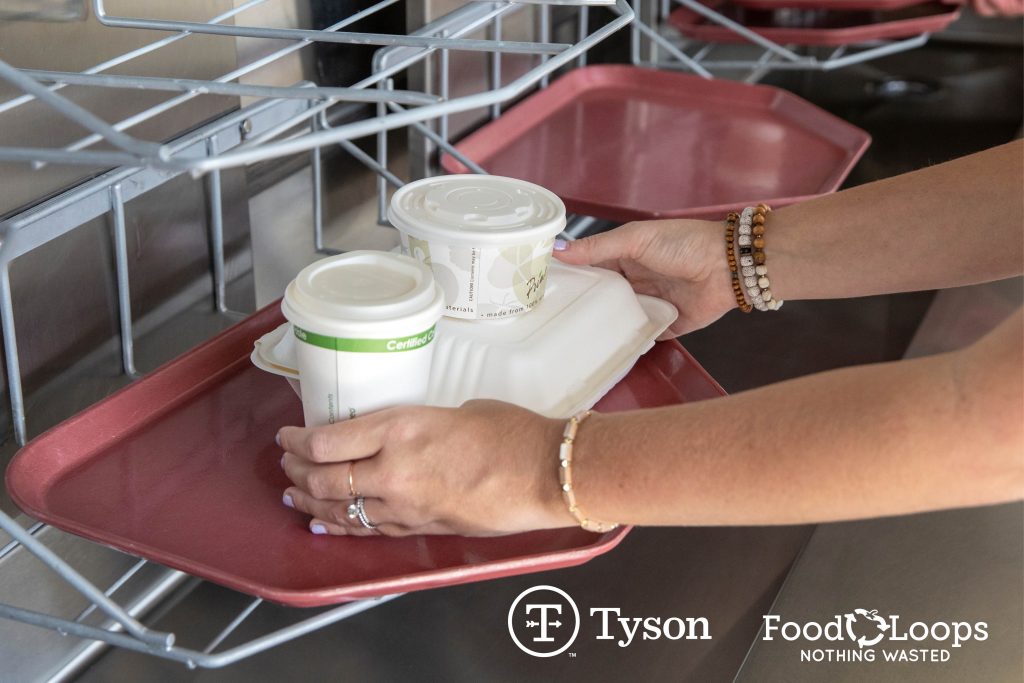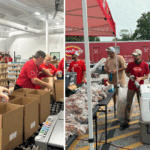Did you know that every year 80,000 tons of food waste end up in the landfill serving Northwest Arkansas’ Benton and Washington counties alone? Managing food waste is one of the many ways we can really make an impact when it comes to sustainability – both as individuals and as a company.
That’s why we have teamed up with Northwest Arkansas food waste solutions company, Food Loops, to pilot a food waste composting program at our World Headquarters in Springdale, Ark. Located right in our own backyard, Food Loops’ “Nothing Wasted” mission is simple yet effective: to reduce the amount of food that enters the landfill and produce an eco-friendly, sustainable fertilizer for local growers and residents.
“Studies have shown that about 30-40 percent of food that is produced in America is wasted. At Tyson Foods, our work towards a zero-waste future starts at home at our world headquarters in Northwest Arkansas”, said Alex Floyd, senior manager of sustainability at Tyson Foods. “This composting pilot will allow us to test and learn how we can be less wasteful and more mindful of what we consider trash. The learnings will help us expand this program to other locations in the future.”
Tyson Foods became the first large corporation to sign on with Food Loops in 2018. After an initial waste assessment, Food Loops created an action plan to combat our specific food waste challenges.
Now, instead of placing garbage and recycling in designated containers, team members simply place trays on a conveyor belt in the cafeteria to be sorted, with uneaten food items and compostable products diverted to designated food waste stations. Food Loops then collects the waste and runs it through a decomposition process, supplying local area farmers, landscapers, and gardeners with a more natural, nutrient-rich soil enhancer. To date, we have diverted over 35 tons of food waste from our World Headquarters cafeteria.
“We are excited to be on this journey towards a more sustainable future with a global company like Tyson Foods,” said Michael Kraus, Co-Founder of Food Loops. “This pilot is already making a big positive impact in Northwest Arkansas, and we hope other companies will be inspired to follow Tyson’s lead when it comes to becoming part of the food waste solution at a commercial scale.”
Reducing Food Waste at Home
Composting is the natural process of recycling organic matter, such as leaves and food scraps, into a valuable fertilizer that can enrich soil and plants. There are many benefits to composting: it enhances the soil, retains moisture, suppresses plant disease/pests, reduces need for chemical fertilizers, and reduces methane emissions from landfills. Currently, food scraps and yard waste together make up more than 30 percent of what we throw away – all material that could be composted instead.
There are many options for composting at home, both indoors and outdoors. The important thing is to start with selecting, saving, and storing your food scraps – tea bags, eggshells, orange peels, potato skins, etc. If you have yard space, you can create a compost pile or bin outside by finding a dry, shady spot in your yard, and adding brown and green materials like leaves and fruit scraps as they’re collected. Once your pile is established, mix grass clippings and green waste into the pile and bury fruit/vegetable waste under 10 inches of compost each time.
For indoor composting, you can find specialty indoor composting bins at local hardware stores and start collecting compostable waste. Some local groups, like Food Loops, also offer residential composting programs with drop off locations for program participants.
Over the last few years, Tyson Foods has worked to replace all our single-use food and beverage containers (food containers, cups, plates, lids, straws) with compostable alternatives at our cafeteria at World Headquarters. Learn more about our holistic approach to building a more sustainable food system here: https://www.tysonsustainability.com/.





